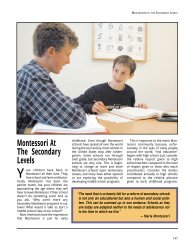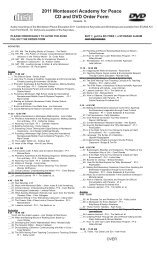Tim Seldin & Paul Epstein Ph.D. An Education for Life
Tim Seldin & Paul Epstein Ph.D. An Education for Life
Tim Seldin & Paul Epstein Ph.D. An Education for Life
You also want an ePaper? Increase the reach of your titles
YUMPU automatically turns print PDFs into web optimized ePapers that Google loves.
MONTESSORI PROGRAMS<br />
are now more than two hundred<br />
Montessori Middle School programs<br />
in North America with numerous others<br />
in various stages of development.<br />
There are approximately twenty high<br />
schools openly identifying themselves<br />
as Montessori, and a growing<br />
number under development.<br />
Montessori’s Vision<br />
of the Erdkinder<br />
Maria Montessori first proposed her<br />
ideas <strong>for</strong> the re<strong>for</strong>m of secondary<br />
education in a series of lectures given<br />
at the University of Amsterdam<br />
in January 1920. They were later<br />
published during the 1930s as part<br />
of her work From Childhood to<br />
Adolescence.<br />
Dr. Montessori’s model of secondary<br />
education is based on her understanding<br />
of the developmental needs<br />
and learning tendencies of early adolescents.<br />
In addition to conceiving<br />
many of the re<strong>for</strong>ms incorporated<br />
into today’s most innovative programs<br />
<strong>for</strong> early adolescents, Montessori<br />
added a unique idea: she recommended<br />
a residential school located<br />
in a country setting.<br />
Montessori believed that by living<br />
independently of their families <strong>for</strong> a<br />
few years in a small rural community,<br />
young people could be trained in<br />
both the history of technology and<br />
civilization, while learning the practical<br />
habits, values, and skills needed to<br />
assume the role of an adult in today’s<br />
society.<br />
Envisioning a school where children<br />
would grow their own food and<br />
live close to nature, she called her<br />
program the Erdkinder, which translates<br />
from the Dutch as “the children<br />
of the Earth” or “children of the<br />
land.”<br />
Dr. Maria Montessori proposed living<br />
and working on a residential farm<br />
school as the best possible education-<br />
150<br />
al setting <strong>for</strong> young adolescents<br />
(twelve- to fifteen-year-olds) as they<br />
transitioned physically, cognitively,<br />
socially, emotionally, and morally to<br />
adulthood.<br />
Montessori believed the demands<br />
of puberty warranted a holiday from<br />
traditional lecture-based instruction.<br />
Instead of confining students to<br />
classrooms, she proposed a program<br />
that would help them accomplish<br />
two key developmental tasks: becoming<br />
psychologically and economically<br />
independent. Only then,<br />
she argued, would young adolescents<br />
escape from the pettiness of<br />
traditional schooling and engage<br />
seriously in the realities of life in<br />
society.<br />
Montessori envisioned the Erdkinder<br />
as a small community of<br />
teenagers and adults located in a<br />
rural setting. Here teachers and students<br />
would live and work together<br />
throughout the year, growing much<br />
of their own food and manufacturing<br />
many of the things they would need<br />
<strong>for</strong> life in the country, thereby developing<br />
a deep sense of their connection<br />
to the land and the nature and<br />
value of work.<br />
She envisioned students, under<br />
adult supervision, managing a hostel<br />
or hotel <strong>for</strong> visiting parents. The students<br />
would sell farm goods and<br />
other products in their own store.<br />
These farm management and store<br />
economics would <strong>for</strong>m the basis of<br />
meaningful academic studies.<br />
The Erdkinder curriculum would<br />
encourage self-expression through<br />
music, art, public speaking, and theater.<br />
Students would also study<br />
languages, mathematics, science,<br />
history of civilizations, cultures,<br />
and technological innovations. The<br />
Erdkinder would possess a “museum<br />
of machinery,” where students<br />
could assemble, use, and repair their<br />
own farm equipment.<br />
For many years the idea of a<br />
residential farm school was explored,<br />
but considered impractical.<br />
Montessori Secondary schools are<br />
now found in urban and suburban<br />
settings in the United States, with<br />
enrollments ranging from fewer<br />
than ten students to public school<br />
programs with more than 250 students.<br />
The cost of organizing a residential<br />
Erdkinder program has been<br />
considered far too high <strong>for</strong> any<br />
one school to attempt; instead,<br />
Montessori Middle School programs<br />
attempt to incorporate as<br />
many Erdkinder components as<br />
possible.<br />
The Montessori community looked<br />
on with considerable interest<br />
in 2001 when David Kahn, Director<br />
of the North American Montessori<br />
Teacher’s Association<br />
(NAMTA), opened the Montessori<br />
Farm School in Huntsburg, Ohio<br />
in conjunction with the Hershey<br />
Montessori School. Serving students<br />
from ages twelve to fifteen,<br />
the Montessori Farm School is a<br />
lovely facility and an exciting project<br />
that has attracted widespread attention,<br />
including a substantial article<br />
in the London <strong>Tim</strong>es.<br />
Many leaders in Secondary Montessori<br />
education believe that the<br />
future will lie primarily with nonresidential<br />
programs. The opening<br />
of the Farm School, and others<br />
like it that may follow, provides an<br />
opportunity to test one of Dr.<br />
Montessori’s hypotheses. She proposed<br />
that the residential community,<br />
with its artificially created social<br />
laboratory, will prove to be of most<br />
value in the completion of the<br />
development of mature, well adjusted<br />
young adults.<br />
A piece prepared by David Kahn<br />
describing the Montessori Farm<br />
School in greater depth follows.




